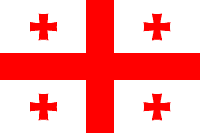Georgia to initiate 15 billion dollar lawsuit against Russia
Georgia may demand compensation from Russia for the damage caused by the military conflicts in Abkhazia and Southern Ossetia and continuing Russian activity in these territories, which Tbilisi no longer controls. “The sum in question would amount to at least 15 billion dollars,” declared Shota Malashkhia, member of the Georgian parliament, to Vremya Novostey. He is in charge of a provisional parliamentary commission concerned with retrieving Georgia’s lost territories, and it was in fact his initiative to bring legal action against Russia .

As a result of the growing alienation between Tbilisi and Moscow, Georgian politicians have followed the same path as their Baltic colleagues, trying to convert the damage inflicted by the “Soviet occupation” into enormous monetary sums. However, there is a certain difference between their approaches for claiming compensation: Baltic politicians want to settle accounts with Moscow for the years in which they both belonged to the USSR, whereas the Georgians want to settle accounts for the disasters and misfortunes inflicted on the republic of Zakavkazie since Georgia gained its independence.
“The decision over which court we will appeal to – perhaps the European Court for Human Rights, for example, or the International Court of Arbitration – will be made in view of the work of a special state commission,” explained Shota Malashkhia. “This commission should be formed after parliament debates the issue this week, and will estimate the sum of the damage, whether it be financial, or resulting from the infringement of human rights, and so on.”
Malashkhia did not name the deadline by which time the final figure will be released - it will depend on how efficiently the accountants carry out their work. When the commission completes its work, Georgia will issue a tender for local and foreign law firms to submit the claim to the courts. “Concurrently the Georgian parliament will establish a group, which will work with other countries’ parliaments to explain to them why Georgia regards what has happened in Abkhazia and Southern Ossetia as an annexation,” remarked the member of parliament. It was at the end of December 2005, when the possibility of a lawsuit against Russia was first mentioned in the Georgian parliament, that Mr. Malashkhia suggested allocating 550 thousand dollars from the state budget “for the creation of a special legal group and issue of a tender for the company which wins it to start work on returning the specified debt to Georgia”.
For the time being the Georgian government is finding it difficult to say just how effective the parliament’s initiative may be. “It is within the deputies’ rights to form such a commission. It is the prerogative of the law courts to decide whether the claim is valid. We will just have to wait and see,” deputy minister for settling conflicts Georgiy Volkiy said.
The preliminary size of the sum being demanded is impressive, considering that Georgia ’s entire budget for this year amounts to 1.7 billion dollars. According to Mr. Malashkhia there is documental evidence that the economic damage resulting merely from the conflict in Abkhazia and its consequences has amounted to 10.7 billion dollars. The logic of this part of the lawsuit is founded on Tbilisi ’s assurance that Moscow is supporting the Abkhazian and South Ossetian separatists. The remaining sum takes into account the unlawful actions (insofar as they were not authorized by Tbilisi) of Russian banks and cellular communication companies on the territory of the rebellious autonomies. In addition Georgia is also planning to demand compensation for moral damage, although the size of this sum has not yet been clarified.
According to Shota Malashkhia, certain Russian mobile phone companies operate in Abkhazia. In the unrecognized republic there is also a local company Akvafon, but Mr. Malashkhia is convinced that this too is supported by Russian business. This view is shared by the head of the National regulatory commission for communications Dmitriy Kitoshvili who declared that, “the Georgian government never issued a licence for Russian mobile phone companies to operate in Abkhazia and therefore their activity in Abkhazia is unlawful. These companies and the Russian government will have to pay out enormous sums to cover the losses which Georgia has incurred”. The Russian authorities and mobile phone operators have refuted Georgia’s claims, declaring that they do not operate in Abkhazia.
At the same time Georgia has expanded the fight against Russian banks which work alongside financial institutions in the territories which are no longer under Georgia ’s control. Several days ago Georgia ’s National Bank sent the international association against money laundering a list of ‘transgressors’. As the Georgian National Bank told Vremya Novostey, 44 Russian banks appeared on this list. And Tbilisi is suggesting that sanctions should be imposed against all of them. In reply the head of the National Bank of Abkhazia announced that “not one Russian bank, nor one from any other country, operates” on the territory of the unrecognized republic.
Translated by James Platt
Subscribe to Pravda.Ru Telegram channel, Facebook, RSS!



